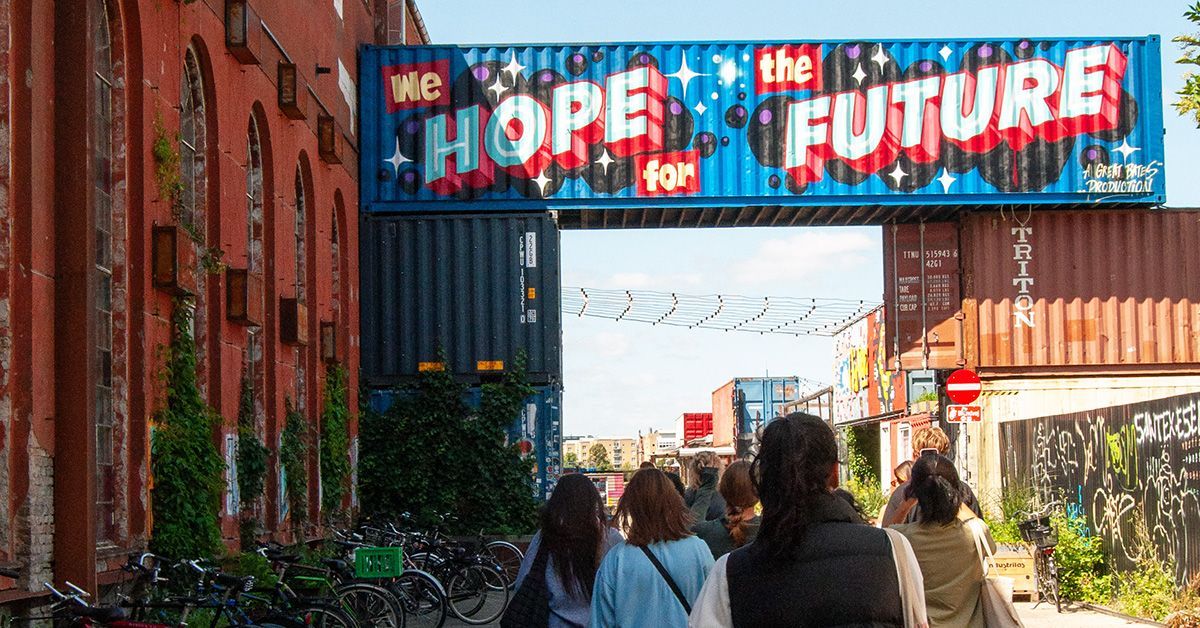Notes From Abroad: First Impressions, New Adventures
Story by:
Published Date
Article Content
From studying sea turtles in Costa Rica to exploring multicultural Spain or diving into contemporary world history in Germany, hundreds of UC San Diego students are choosing to live and learn in faraway places this summer.
Two study abroad programs—UC San Diego’s Global Seminars and the new Future Innovators Global Internship Program—are opening doors for students to pursue academic and professional opportunities across continents. This summer, we asked a group of students to document their global learning journeys.
Follow along with UC San Diego Today and on UC San Diego's official Instagram, TikTok and YouTube accounts as eight students share reflections, photos and other content—hoping to inspire anyone who dreams of venturing out to take a chance and see the world in transformative ways.
Madeline Balzarini | Cape Town, South Africa
Future Innovators Global Internship Program
"When I stepped onto the plane to begin my adventure, I was in the summer season. And when I stepped off the plane in Cape Town 31 hours later, I was in winter. That was the moment it hit me: I was across the globe with eight weeks of new experiences ahead of me.
In the beginning, it was a whirlwind of change. I met 26 people in the internship program, learned the layout of my apartment complex and familiarized myself with the surrounding area. I adjusted to the time difference and corresponding times I could talk to my loved ones back home. It was a lot of newness wrapped in amazing stand-out moments.
I practiced yoga at the world-famous Kirstenbosch National Botanical Garden on National Yoga Day. The garden is massive and enchanting. Another day, we took a cable car up to Table Mountain. It was sunny as we rose and became overcast at the top. We walked amongst plumes of fog, low-lying shrubs and little furry creatures named dassies. I got to see African Penguins at Boulder Beach and hike to the southernmost point of the African continent, named Cape of Good Hope. We saw wild pigs and a family of baboons. And for my birthday, I dined in a beautiful rooftop restaurant overlooking much of the city.
The more I learn about Cape Town, the more I learn how spaces that may appear simple on the surface can have multidimensional meanings and deep history. I am excited to keep learning about the places and people that make Cape Town so special.”
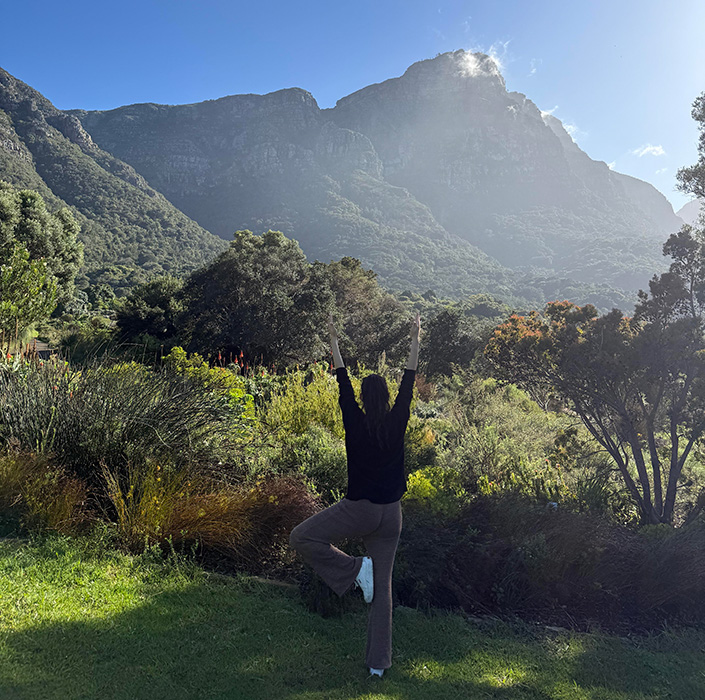

Gerardo Flores | Barcelona, Spain
Global Seminar: Multilingual and Multicultural Spain
“I chose the Barcelona program because I thought it would be a truly immersive experience that prioritized connecting with the local community. Now that I'm here, it’s exactly that and more. So far, we’ve had the chance to engage with the city through guided tours, neighborhood explorations and lessons about Barcelona's rich history captured in the linguistic landscape. Posters, signs and public art reflect the community’s sentiments and multilingual identity.
I’ve always dreamed of visiting Spain. As a native Spanish speaker, I knew it would be both exciting and challenging since the Spanish spoken here is different from the one I’m used to. The strong presence of Catalan has pushed me to learn and adapt. Another factor that drew me to this specific area was learning how queer-friendly Barcelona is, which has been wonderful to see firsthand.
I plan to fully take advantage of this opportunity to connect with my peers, make lasting memories and expand my worldview. I’m also hoping to travel to other cities such as Milan, Paris and Ibiza. In fact, I am on my way to Madrid while writing this!
This is my first time traveling abroad. I was worried about feeling homesick, but so far I've felt right at home. I love my accommodations, the people and even figuring out the public transportation. If anything, my sleep schedule is the only thing suffering right now, but I take it as proof that I'm making the most of every moment here!”
Mani Sefas-Loos | Berlin, Germany
Global Seminar: Contemporary World History
“Ask the average American about German history, and they’ll likely bring up the same few topics: the fall of the Berlin Wall, the horrors of the Holocaust and the excessive casualties in World War I. What you’re unlikely to hear about is the first genocide of the 20th century—the German extermination of the Herero and Nama peoples.
Between 1904 and 1907, German colonists killed between 50,000-65,000 Herero and 10,000 Nama peoples in German Southwest Africa, what is now Namibia, for leading a rebellion against colonial rule. This bloody, previously unacknowledged part of Germany’s history, as well as the broader history of European colonialism, is a major focus of the Humboldt Forum in Berlin.
My Global Seminar class recently visited the Humboldt Forum, located in the former Berlin Palace, which was built in the 15th century and housed Prussian kings and German kaisers for hundreds of years. In our tour of the Forum’s exhibition on Africa, what I found most interesting was the critical context in which the artifacts are presented.
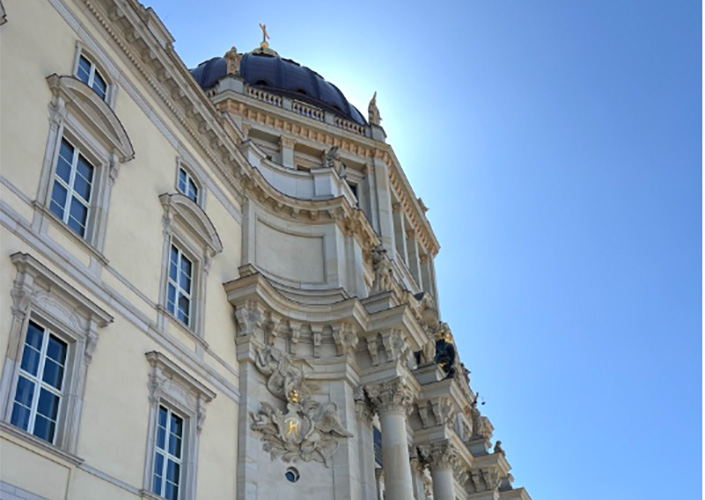
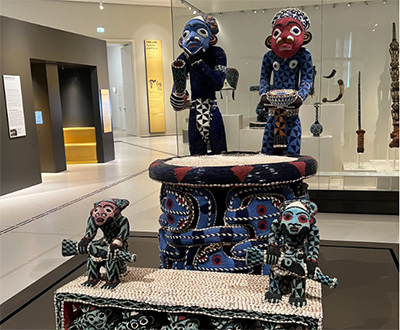
The vast majority of the displayed items were acquired during European colonialism, if not explicitly stolen. And as our tour guide highlighted, there is fierce debate about the legitimacy of former European colonizing forces owning and displaying the spoils of their conquests.
I found this exhibition to be incredibly moving and powerful. Inside a representation of imperial power, the Humboldt Forum highlights the oppressed—acknowledging the victims of colonialism and bringing to the front their oft-ignored stories.”
Mollie King | Copenhagen, Denmark
Global Seminar: Storytelling for a Changing Planet
“I knew that this program was perfect for me when I read about it in a Seventh College email. Copenhagen leads the world in climate initiatives, implementing paradigm-shifting technologies that uplift the well-being of both people and the planet.
Even though we’ve been here a short time, I feel like I know more about Copenhagen than I do about my own city in some aspects. We’ve had the opportunity to visit the newsroom of Verdens Bedste Nyheder, to climb through the processing systems of Copenhagen’s largest power plant and incinerator called Copenhill, and to walk around the city—exploring the best food hubs, cultural sites and swim spots along the canals.
When professionals at the newsroom and power plant asked us about our knowledge of waste management, sustainability, news sources and climate change initiatives in San Diego, I realized that I have much more to learn. Waste management in San Diego can be convoluted and hard to understand, but here in Copenhagen, there is an emphasis that starts as early as grammar school for children to learn about where their waste goes and where their energy comes from.
The newsroom CEO and director told us that his goal with Verdens Bedste Nyheder is to break down misconceptions of the world. He said, ‘The world is better than we think.’ In the coming weeks, I am excited to learn more about how Copenhagen invests in hope.”
Abigail McMurry | Berlin, Germany
Future Innovators Global Internship Program
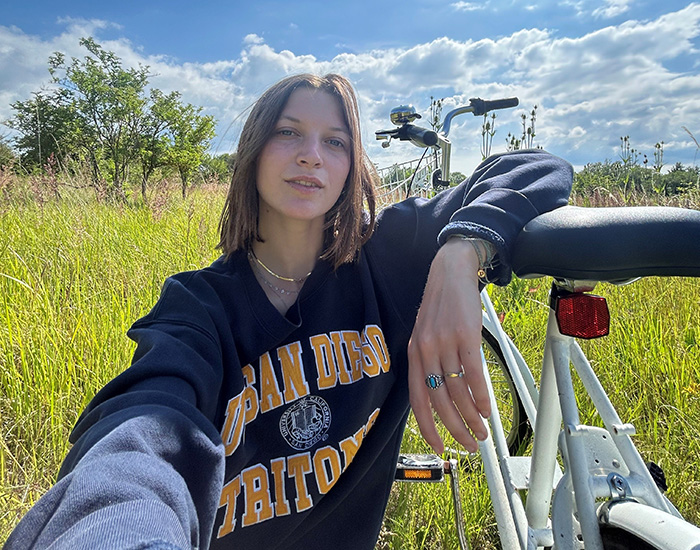
"Although I’ve traveled to other countries, this is the first time I’ve traveled to a country where I don’t understand any of the language. And while many people in Berlin speak English, it’s important to not assume everyone does. I’ve had encounters where people understand me but cannot respond back in English, or we’ve had to use Google Translate to communicate. This cross-cultural exchange only further opens my eyes.
I’m still surprised by how long it takes me to go grocery shopping—mostly because groceries are labeled in German but also because there are so many new, exciting products to find. The groceries seem reasonable for a major city, and grocery stores are plentiful.
This is also the most walkable city I have ever visited. And with the monthly transit pass for local trains, buses, trams and subways only being €58, I have been able to save a lot of money.
There are so many parks within the Berlin city limits. Exploring them all has been my goal, and a simple way to explore the neighborhoods, cuisines and museums they hold. I’m especially excited about weekend trips I have planned in close major cities like Hamburg and Prague. I’ve met great people in this program so I’m looking forward to traveling with them and building new memories along the way.
So far, I am loving this city!”
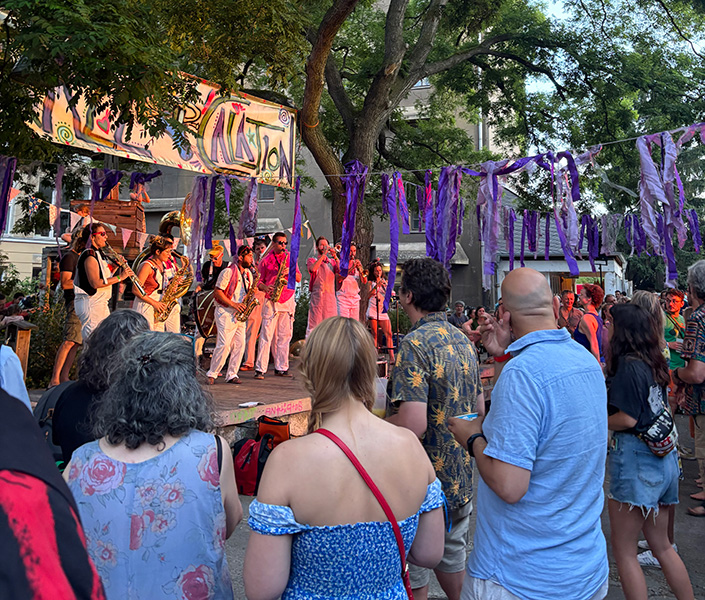

Leilani Rivera | Tokyo, Japan
Global Seminar: Genetics, Diversity and Human Biology
“I chose to study abroad in Japan because I thought it would be a great opportunity for me to experience something new. Getting to do schoolwork while abroad is also a plus! I love the fact that I’m able to travel with students my age who have the same drive as me.
When I arrived in Japan, I was excited and a bit nervous. I was excited to meet everyone in the program and just live life in Tokyo. But I was also nervous because this is my first experience traveling abroad, and I had to travel alone. The nervousness quickly disappeared when I remembered that this experience is going to be the best.
I’m really looking forward to all the excursions planned during our stay. This past week alone, we went to museums, the University of Tokyo and an aquarium. I have the best time exploring these places and learning at the same time.
One of the biggest surprises I’ve had is the food. I was told before I left that there was really good food, but I didn’t realize that it was this good! It is going to be hard for me to go back to eating in the States because every meal I’ve had here has been amazing!”
Milind Kankipati | Guanacaste, Costa Rica
Global Seminar: Sea Turtles and Tropical Ecology
"Studying abroad in Costa Rica has already been a transformative academic and personal experience.
During our first week, we stayed in the coastal town of San Juanillo. Adjusting to the living conditions took some time, especially getting used to the bugs (there are a lot), but the immersive nature of the experience has made it all incredibly worth it. Living with a host family adds a deep personal layer to the trip. Every meal has introduced me to staples of Costa Rican cuisine—mainly rice and beans served with a variety of fresh fruits and vegetables.
The coursework here is unlike anything I’ve experienced in university so far. I’ve been able to conduct fieldwork both in the rainforest and on the beach. In the rainforest, we collected ecological data on tree size, density and species composition. At the beach, we participated in a mark-and-recapture study with hermit crabs—actually helping tag and monitor the incredible creatures.
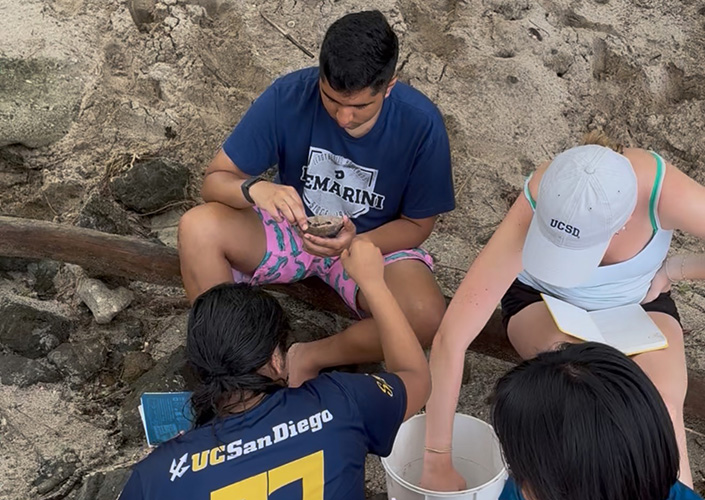
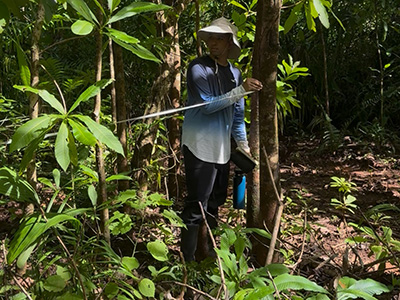
What makes this experience more meaningful is knowing that the data we collect is part of ongoing research used by the Costa Rican government to inform environmental policy and conservation strategies. It’s one thing to learn about conservation in a classroom; it’s another to physically take part in it alongside local researchers and biologists.
This program has pushed me outside of my comfort zone in the best ways. I’ve learned more than ever expected in just one week, and I’m excited to see how the rest of the trip continues to shape my perspectives on science, culture and the environment."
Pamela Rojas | London, England
Future Innovators Global Internship Program
“London was my first choice for studying abroad, especially as a business economics major. The city is a global hub for innovation, finance and entrepreneurship, and I knew being here would stretch me in all the right ways. For these eight weeks, I’ve set a clear intention: I want to learn as much as I can from my mentor, gain a global perspective on business and return home with fresh ideas that can drive innovation in my community.
When I first stepped off the plane in London, I felt a powerful mix of fear and excitement. Everything felt surreal—the accents, the architecture, the energy of the streets. My first day at the office, I remember walking into the building and thinking, ‘Is this really happening? Am I really going to start working in London?’ As I explored the office, I kept thinking of my journey from Peru to here, and how every risk I’d taken had led me to this moment.
Adjusting to a new place, adapting to a new rhythm of life, always comes with challenges. But I’m learning to embrace the discomfort as part of the growth. Each day, I’m building more confidence in my work, asking questions and stepping out of my comfort zone. This is a big step in my life. It’s both a personal and professional milestone, and I feel incredibly grateful to be living it."
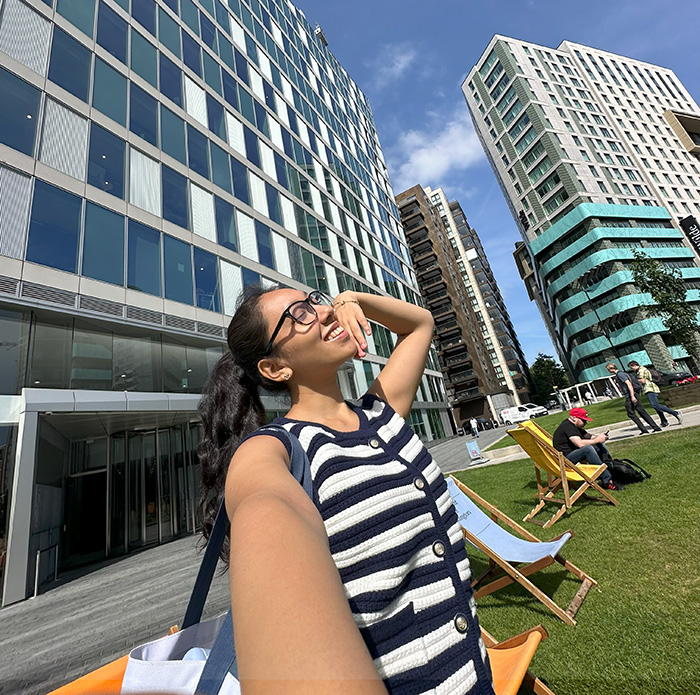
Share This:
You May Also Like
Stay in the Know
Keep up with all the latest from UC San Diego. Subscribe to the newsletter today.
